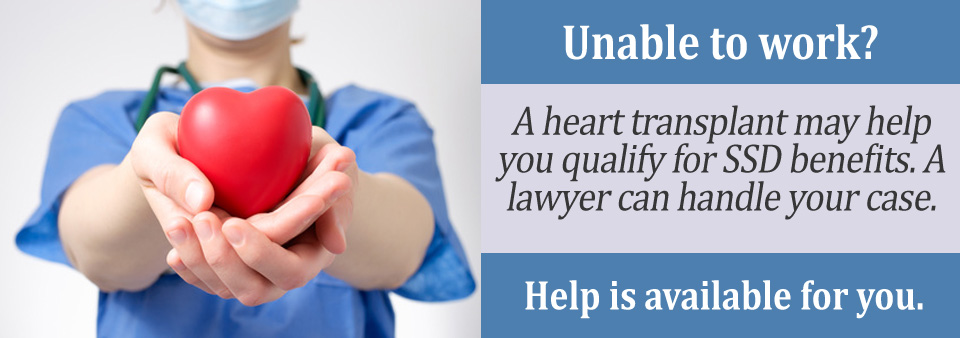Considered one of the most complex medical procedures, a heart transplant represents a procedure conducted for patients that suffer from end stage heart failure or a case of severe artery disease. The procedure is typically performed when other medical treatment options have failed.
Potentially dangerous outcomes of a heart transplant include the body rejecting the new heart, which can cause acute blood circulatory problems. Heart transplant patients rarely have the stamina to work a full time job, which means they need to seek financial assistance to pay for daily living expenses and the high costs of treating heart transplant symptoms. A federal safety net program called Social Security Disability Insurance (SSDI) offers heart transplant patients the financial resources they need to live without a job.
What is SSDI?
Managed by the Social Security Administration (SSA), SSDI represents a federal safety net program that takes care of American workers that lost their jobs because of a total disability. Take note that SSA offers SSDI benefits only for applicants that meet the criteria for a full total disability, not a partial or a short-term disability.
After initially going over your SSDI application, the SSA hands off the paperwork to your state’s Disability Determination Services (DDS) for a much more thorough review. The ensuing in depth investigation determines whether the evidence you submitted matches the symptom criteria listed in the SSA Blue Book for a heart transplant.
A heart transplant often leads to unfavorable outcomes that include death. SSDI contains a provision that grants surviving spouses the legal power to seek financial assistance upon a spouse’s death. The surviving spouse must reach retirement age to receive full survivor benefits or turn 60 years old to receive partial SSDI survivor benefits.

SSDI and the Impact on Medicare
As perhaps the most recognized federal safety net program, Medicare takes care of the health insurance costs for eligible Americans. If you receive SSDI benefits because of a heart transplant and you are Medicare eligible, federal law states you must wait two years to receive Medicare health insurance.
The reasoning for the delay is SSDI benefits should pay for virtually every cost associated with a heart transplant. Federal law allows SSDI recipients to enroll in a health insurance program offered by a former employer.
Returning to Work after a Heart Transplant
The SSA runs the SSDI program not only to help disabled American workers pay for daily living expenses and the costs associated with medical care. It also manages two programs that help disabled American workers transition back into the workforce.
Both the Ticket to Work and Plan to Achieve Self-Support (PASS) programs provide disabled American workers with a strategy to save money for learning new job skills. The primary goal of the SSA is to help disabled workers become self-sufficient, while at the same time lowering the number of participants in the SSDI program.
Undergo a Free Case Evaluation
As a startling fact of the SSDI application process, the SSA rejects the majority of SSDI application submitted by American workers. The most common reason for the high frequency of SSDI application rejections is applicants do not provide enough convincing evidence to warrant approval of their applications.
Complete a Free Case Evaluation to get in touch with a lawyer that takes cases in your state today!